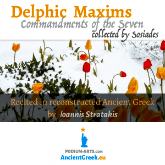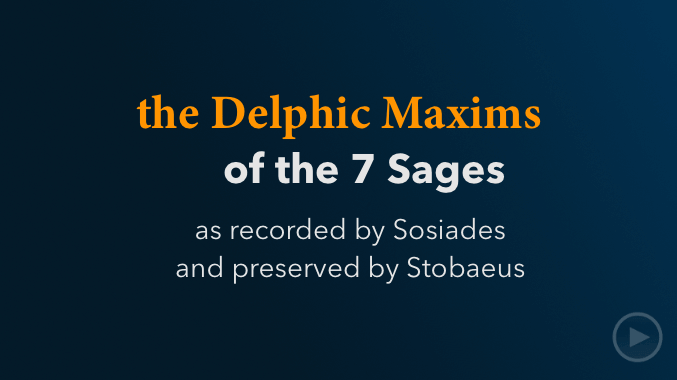• the Delphic Maxims •
• Sosiades - Stobaeus •

Duration: 16 mins 21 secs
Unabridged
Recorded: 2024
Price : $/€ 15 - 25
About the “Delphic Maxims" – a Guide for Virtuous Living
The Delphic Maxims, a set of 147 aphorisms, reflect the ethical teachings and practical wisdom of ancient Greece. Inscribed on the Temple of Apollo at Delphi, these maxims served as a guide to personal conduct and morality for those who visited the sacred site. The most famous of these, “Know thyself,” “Nothing in excess,” and “Give a pledge and trouble is at hand,” were prominently displayed at the temple’s entrance and have been widely quoted and referenced throughout history.
Traditionally, the maxims are attributed to the Seven Sages of Greece, a group of early 6th-century philosophers, statesmen, and law-givers who were celebrated for their wisdom. However, it is more likely that these sayings were popular proverbs of the time, which were later associated with these legendary figures.
Stobaeus, a 5th-century CE Greek anthologist, compiled these maxims, providing us with a rich resource that continues to offer guidance on leading a virtuous and balanced life. The maxims encompass a wide range of themes, including advice on love, friendship, work, debt, reward, wealth, honor, and respect. They are concise phrases that encapsulate the spirit of Greek philosophy and offer practical advice for various aspects of life.
Central to the Delphic Maxims are precepts that emphasize religious devotion, respect for civic authority, and familial honor:
Follow God, Obey the law, Worship the Gods, Respect your parents.
These maxims underscore the importance of adhering to divine and societal norms, maintaining piety, and honoring one’s family.
Personal integrity and self-discipline are also highlighted: Be overcome by justice, Control yourself, Know what you have learned
Perceive what you have heard.
These teachings emphasize the value of understanding and wisdom, urging individuals to internalize knowledge and control their actions.
Social bonds and authentic living are promoted through maxims such as: Be yourself, Intend to get married, Know your opportunity, Think as a mortal.
These encourage authenticity, the pursuit of meaningful relationships, and an awareness of life's fleeting nature.
The maxims also advocate for loyalty and emotional regulation: Help your friends, Control anger, Exercise prudence, Honor providence.
Such advice fosters strong communal bonds and a balanced emotional state.
Despite being over two millennia old, the Delphic Maxims remain relevant today. They inspire and provoke thought about virtues such as self-awareness, moderation, and the complexities of human commitments. They encourage introspection, self-control, and the pursuit of excellence in all aspects of life.
In essence, the Delphic Maxims are not just historical artifacts but timeless principles that still resonate with contemporary audiences. They remind us of the universal and enduring nature of wisdom and the importance of living a life of integrity and purpose. As we navigate the complexities of modern existence, these ancient words of wisdom provide a compass by which we can align our actions and decisions with the values of honesty, respect, and moderation. The Delphic Maxims, therefore, stand as a testament to the profound insight and enduring legacy of ancient Greek philosophy.
You can follow the Greek text of the Delphic Maxims, by the Seven Sages, online at the "Wikipedia" website. A translation in English is also found on the same location
About the Authorship of the Delphic Maxims
Tradition wants that the Delphic Maxims are sayings of the Seven Sages of Greek antiquity (Gr.: Ἑπτά or Ἑπτὰ Σοφοί ). These were renowned philosophers, statesmen, and law-givers who lived during the early 6th century BCE. They are celebrated for their wisdom and practical contributions to Greek society.
The most commonly recognized Seven Sages are:
Thales of Miletus: Known for his work in philosophy and natural sciences.
Solon of Athens: A lawmaker and poet, famous for his legal reforms in Athens.
Chilon of Sparta: A Spartan politician and ephor who emphasized moderation and governance.
Bias of Priene: A statesman known for his judicial wisdom and fairness.
Pittacus of Mytilene: A general and statesman who enacted laws and reforms.
Cleobulus of Lindos: A ruler and philosopher known for his sayings and riddles.
Periander of Corinth: A tyrant who was also a patron of the arts and a proponent of legal reforms.
Stobaeus (5th century CE) (Gr.: Στοβαῖος) was a Greek anthologist who compiled extracts from earlier Greek authors in his work "Anthologium," preserving a wealth of classical wisdom and philosophy. His collection includes moral maxims, sayings, and precepts attributed to various philosophers and sages, including the Delphic Maxims.
Sosiades, (Gr.: Σωσιάδης) another lesser-known compiler, also contributed to the preservation of ancient Greek wisdom, though much less is known about his works compared to Stobaeus. His contributions are often referenced in discussions about the transmission of Greek philosophical and ethical teachings.
Together, these figures played crucial roles in shaping and preserving the intellectual heritage of ancient Greece, ensuring that the wisdom of the Seven Sages and other thinkers was passed down through the ages.
More about the Delphic Maxims can be found with a simple search via the "google" website
About the Seven Sages there's a short illuminating article of Richard P. Martin of Stanford Uni. at the Academia.edu website.
About the audiobook c.q. videobook
 The recording contains the complete, unabridged Ancient Greek text of the 147 Delphic Maxims of the Seven Sages of Ancient Greece. After purchase you will be able to download the relevant .mp3 audiobook file or the .mp4 videobook (which comes with translated subtitles in various languages).
The recording contains the complete, unabridged Ancient Greek text of the 147 Delphic Maxims of the Seven Sages of Ancient Greece. After purchase you will be able to download the relevant .mp3 audiobook file or the .mp4 videobook (which comes with translated subtitles in various languages).
Both editions repeat the Greek text of each Maxim with a pause of some seconds for learning purposes.
NB: in case you prefer an audiobook without the repeated text, please send me an email at the support address you received at purchase.
You can listen to the first 7 of the Delphic Maxims, an audio sample of the present audiobook and videobook. Please, click on the play-button bellow and, if you wish, follow the Ancient Greek text lower on the page, or alternatively watch the video, which is provided with a translation in English. Thank you!
ΥΠΟΘΗΚΑΙ ΤΩΝ ΕΠΤΑ
Ἕπου θεῷ
Νόμῳ πείθου
Θεοὺς σέβου
Γονεῖς αἰδοῦ
Ἡττῶ ὑπὸ δικαίου
Γνῶθι μαθών
Ἀκούσας νόει
